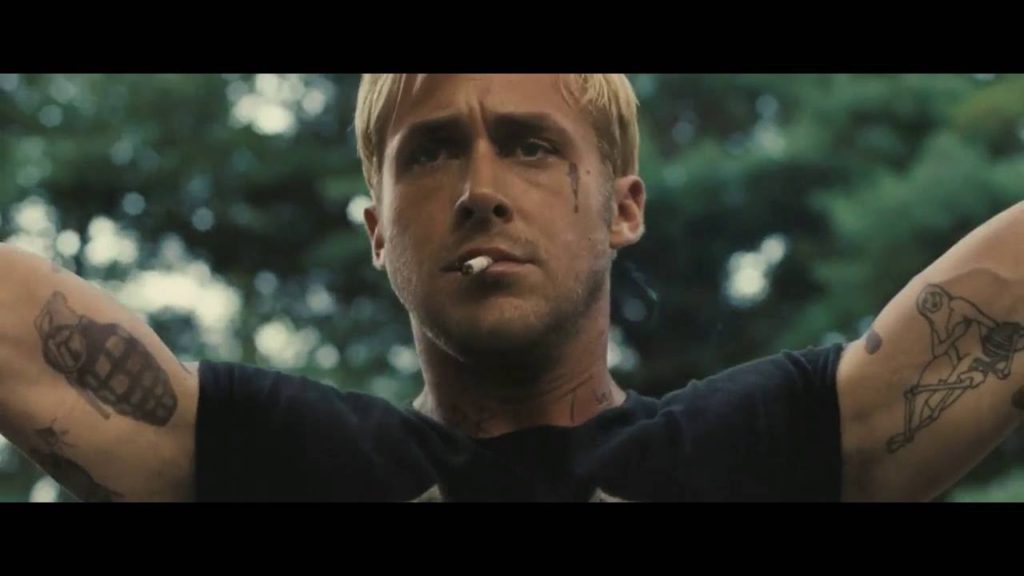The Place Beyond the Pines
- 140 minutes. Rated R.
“He can get his own girl and his own kid, that’s every man’s right.”

In Place Beyond the Pines, Ryan Gosling plays Luke Glanton, a stunt driver who works at a town carnival, riding his motorcycle in a cage for an array of local female fans. At first glance of his tattooed, chiseled, je n’est sais pas how hot I am, leather-skinny-pants-form, viewers will deduce that minimum wage is a challenge for this unfortunate guy. We all know by now how effortlessly Gosling oozes vulnerability no matter what his role; let’s face it, he could play the most hideous of anti-social troglodytes; and he would both creep us out and look hot and effortlessly cool doing it. I say (please indulge me) they cast him to star in Deliverance, or the campy (grossly disturbing)–for you, Jessica!) Mother’s Day. Squeal like a pig, indeed. And even if he’s not “your type,” if you thought you were cynical enough to brush him off owing to this ubiquitous Paul Newman-like sex appeal, well, think again. I tried and I failed. The guy is up there with James Dean and River Phoenix in my book. He has earned these acting chops too, despite the ironically self-conscious, blue collar image that seems to propel him into a range with better, older, uglier actors that deserve it.
Eva Mendes plays Romina, a woman Luke has been lovers with and is, unwittingly, the father of her infant son. When her mother shares this information with Luke, he makes it his new mission to attempt to be the father (he never had his) to his son and do right by Romina. Unfortunately, Luke is driven to crime in a quick and easy bank robbing opportunity, and though the first few thefts prove successful, due to his skillful motorcycling, his luck soon runs out when he comes face-to-face with a driven cop, Avery Cross (Bradley Cooper). After Avery chases him into a house and reluctantly takes him down, he is awarded for his bravery and lies to cover up the shooting, claiming Luke fired first. The robbery money is taken from Romina’s apartment by the cops, he feels bad and tries to return this to her (as a regular guy), but she won’t accept it, claiming he has ruined her son’s life. He tries to give it back to his boss, then he is able to rat out some crooked cop he spies tampering in the evidence room when he is on duty and climbs in his rank to become a DA.
Fifteen years later, Avery has a kid, AJ (Emory Cohen), who happens to be the same age as Luke and Romina’s son Jason, (Dane DeHaan). Mahershala Ali portrays his role as stand-up replacement father Kofi Kancam (Romina’s new husband) and Ray Liotta is great ( as usual) as the corrupt Peter Deluca.
Derek Cianfrance is a director who loves his characters to feel free to be and explore, and it’s this uncoerced emotional delivery in domestic-dramas Blue Valentine and Place Beyond the Pines that convince the audience his players are as authentic as the script. All peripheral characters are strongly cast. Well-acted and intriguing in scope, it’s a very ambitious piece covering a long time space. I mean, fifteen years is a whole LOT of subject matter to cover in one flick, especially when you introduce new characters halfway through.
Shakespearean in its dramatic feat, so much happens after the first half, which I considered so powerful in acting and execution, that it is almost unbelievable to shift gears into the final portion and get attached to a second batch of characters (despite the aging of the most important ones). The first half is quite slow and builds to a peak, plateaus, satisfies with compelling character arcs, then by the third act builds itself up again, but perhaps wraps up too tightly. It started to seem like a REALLY entertaining episode of Law and Order by the last half hour. With that said, from a writer/director standpoint, Cianfrance pulls off this crime drama pretty well, despite the packed plot and intensity in development of the second act characters.
The muted lighting reinforces this sense of reality within the story. Outside scenes are often stark or heavy (think house/hotel scenes in Blue Valentine), mirroring the realities of the relationships; scenes are powerful in that we as an audience feel as drained as the characters that are revealing themselves to us. The film opens with Luke making his way to his cage. Quite literally, from the beginning there is a distinct trapped feeling as we see him get inside and drive in circles, going around and around again and again. After his successful cage ride, we see both Romina and Luke and that entrapment pervades all of the interactions they have with each other. He is back, she still has lingering feelings but now she has his child. She is stuck. He can’t provide for her. Stuck. He wants to provide for his kid, give his life purpose, but he can’t do that. Stuck. There is a moment when he watches his son being baptized and he realizes this and the look of pain on Gosling’s face is so telling and so depressing. Really, you want to grasp at him and tell him not to take the extremes he chooses, but what can the guy do?
Indie ambient listeners will appreciate that Cianfrance had Mike Patton, lead singer of Mr. Bungle, Tomahawk, and Faith No More create the poignant piano pieces and choral work, which felt Vangelis-like (Blade Runner kept coming to mind–but check out what this guy thinks). Overall, the score evokes a somber realism which compliments the sentiments and moods in the film so well. If you are a fan of moody crime-dramas and could appreciated the enervating realism of Blue Valentine, you should see this film.
